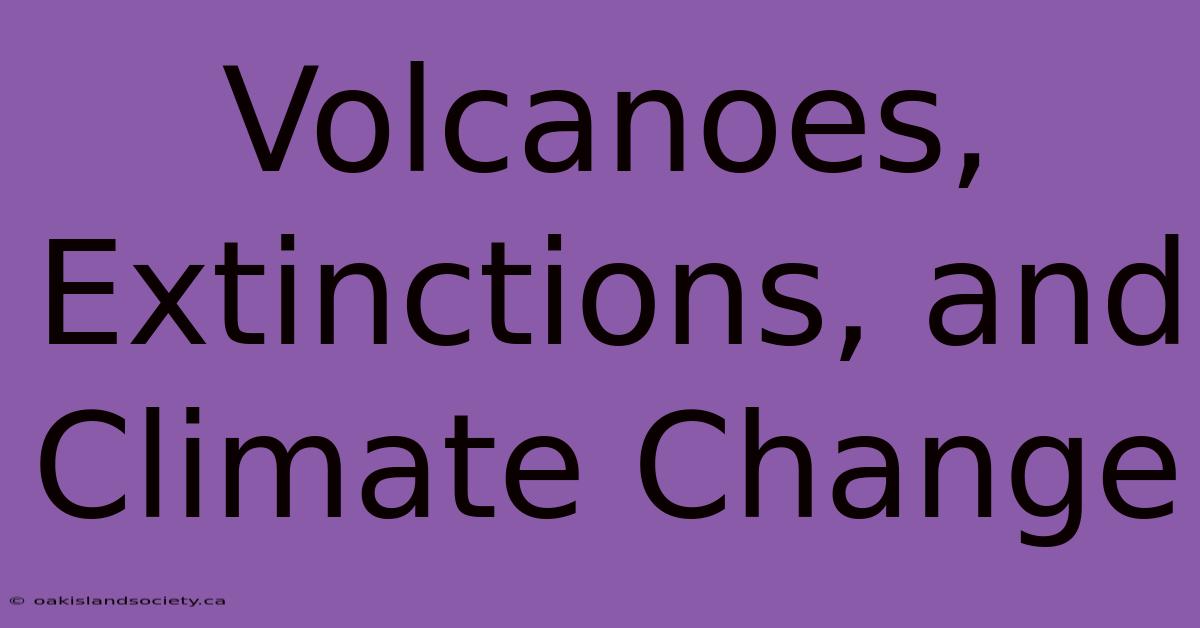Volcanoes, Extinctions, and Climate Change: A Fiery Tale of Earth's Past and Future
Have you ever wondered about the fiery power of volcanoes and their potential to reshape the Earth? Volcanic eruptions, while awe-inspiring, can have devastating consequences, including mass extinctions and dramatic shifts in our planet's climate. This article delves into the complex relationship between volcanoes, extinctions, and climate change, exploring the dramatic events of Earth's past and their implications for our future.
Why This Topic Matters:
Understanding the interplay between volcanic activity, extinction events, and climate change is crucial for comprehending Earth's history and its potential future. By analyzing past events, we can gain valuable insights into the intricate processes driving our planet's climate system. This knowledge empowers us to better predict and mitigate the risks associated with future volcanic eruptions and their impact on our environment.
Key Takeaways:
| Takeaway | Description |
|---|---|
| Volcanic Eruptions Can Trigger Mass Extinctions: Massive eruptions release massive amounts of gases and ash into the atmosphere, causing global cooling and acid rain, potentially leading to widespread extinctions. | |
| Volcanoes Can Drive Climate Change: Volcanic activity releases greenhouse gases like carbon dioxide, contributing to long-term warming trends. However, large eruptions can also cause short-term cooling due to the release of reflective aerosols. | |
| Extinction Events May Be Linked to Volcanic Activity: Several mass extinction events in Earth's history are linked to volcanic eruptions, showcasing the destructive power of these natural phenomena. |
Volcanoes and Extinctions: A History of Fiery Catastrophes
Volcanic eruptions have played a significant role in shaping life on Earth, both through destruction and innovation. Massive eruptions, known as large igneous provinces (LIPs), have repeatedly reshaped continents and altered Earth's climate. The Permian-Triassic extinction event, which wiped out over 90% of marine species and 70% of terrestrial species, is believed to have been triggered by a massive LIP eruption in Siberia. This event released vast quantities of greenhouse gases, leading to severe global warming and acid rain.
The Role of Volcanoes in Climate Change
While volcanic eruptions can cause short-term cooling due to the release of reflective aerosols, their long-term impact on climate is primarily linked to greenhouse gas emissions. Volcanoes release significant amounts of carbon dioxide, a major greenhouse gas, contributing to the overall warming of the planet. The Deccan Traps, a vast volcanic province in India, formed around 66 million years ago, coinciding with the Chicxulub impact that wiped out the dinosaurs. The Deccan Traps' eruption released massive amounts of carbon dioxide, potentially exacerbating the impact of the asteroid.
Connecting the Dots: Volcanoes, Extinctions, and Climate Change
The relationship between volcanoes, extinctions, and climate change is complex and multifaceted. While volcanic activity can trigger abrupt climate shifts and mass extinction events, it also contributes to long-term warming trends. Understanding these interconnected processes is crucial for comprehending Earth's history and its potential future.
Volcanic Eruptions: A Constant Threat
Volcanic eruptions remain a constant threat, capable of causing widespread devastation and altering the Earth's climate. While modern societies are better equipped to respond to volcanic eruptions, the potential for catastrophic events remains. Monitoring volcanic activity and developing mitigation strategies are vital for mitigating the risks associated with future eruptions.
FAQ
Q: Can volcanic eruptions cause mass extinctions?
A: Yes, massive volcanic eruptions, like LIPs, have been linked to several mass extinction events in Earth's history. They release vast quantities of gases and ash, leading to global cooling, acid rain, and other environmental disruptions that can cause widespread extinctions.
Q: How do volcanoes contribute to climate change?
A: Volcanoes release greenhouse gases, primarily carbon dioxide, which contribute to long-term warming trends. However, large eruptions can also cause short-term cooling due to the release of reflective aerosols.
Q: What can we do to mitigate the risks associated with volcanic eruptions?
A: Monitoring volcanic activity through advanced technologies and developing evacuation plans are vital steps in mitigating the risks associated with eruptions. Investing in research on the effects of volcanic eruptions and developing mitigation strategies can help us better prepare for future events.
Tips for Staying Informed
- Stay updated on volcanic activity through reliable sources like the United States Geological Survey (USGS) and the Global Volcanism Program.
- Learn about the volcanic hazards in your region and follow evacuation plans if necessary.
- Support research on volcanic activity and climate change.
Summary
Volcanoes are powerful forces that have shaped the Earth's history, leaving behind a fiery legacy of extinctions and climate change. Understanding the interplay between volcanic activity, extinctions, and climate change is essential for comprehending our planet's past and its potential future. By monitoring volcanic activity, developing mitigation strategies, and supporting research, we can better prepare for the risks associated with future eruptions and their impact on our environment.
Closing Message: As we navigate the complex relationship between volcanoes, extinctions, and climate change, it's crucial to remember that we are part of an interconnected ecosystem. By understanding the past, we can learn from the mistakes of our ancestors and build a sustainable future for ourselves and generations to come.

